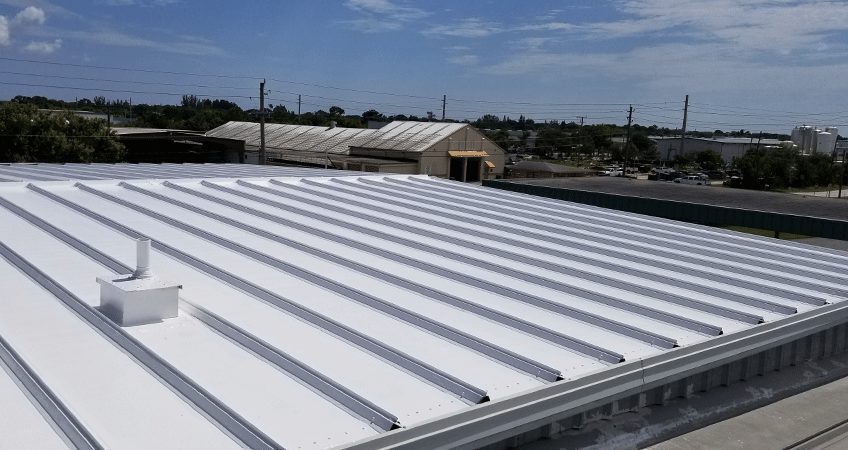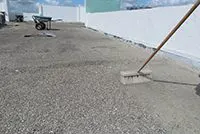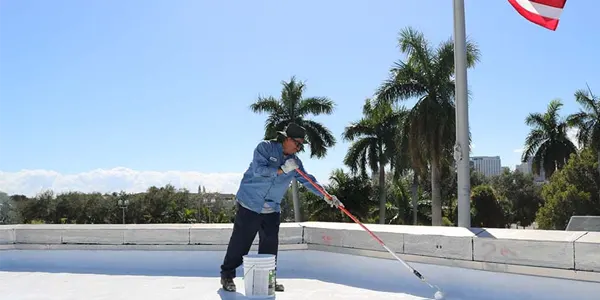Commercial Roof Types
Home //
Introduction
Commercial Roof Types
Are you looking to install a new roof on your commercial property? Are you overwhelmed by the number of options available?
The truth is that there is a wide variety of roofs, from built-up roofing (BUR) systems to modified bitumen systems, single-ply membrane systems, to reflective roof coatings. Each one offers advantages, but not all work for all commercial properties.
At Advanced Roofing, we tell you everything you need to know about commercial roof types, from the features of each to their strengths to how affordable they are, all to help you choose the right one.
Let’s get started!

Benefits
Benefits of Each Roofing Type
These are the commercial roof types used for commercial buildings in Florida. They can withstand the extreme weather conditions that characterize our sunny state.
Let’s see the commercial roofing advantages one by one!

This BUR roofing system is a multi-layered surface protection system. The system is composed of a first base sheet placed on top of the roofing board, which allows the other sheets to adhere and waterproof your property. Then, an asphalt layer is placed to apply the next sheet, which can be reinforced felt or a plywood sheet. This sheet-on-sheet is repeated until the desired thickness is obtained.
Features:
- Due to its layered composition, this type of roofing has excellent resistance to seasonal changes in the state, especially the high incidence of the sun.
- Built-up roofing (BUR) systems are highly recommended for Florida commercial buildings with flat or low-slope roofs.
- Reinforced: If any top layers deteriorate, the others continue to protect your property.
- Reflective: improve thermal insulation by helping to reflect the sun’s rays.
- Durability: Built-up roofing (BUR) Systems have a life span of 15 to 20 years.

This multi-layer system is similar to the built up roofing (BUR) systems. Still, it comprises five layers: a first layer of insulation to improve thermal resistance, the modified base, the bitumen membranes (reinforced with rubber or fiberglass), the adhesive, and the surface.
This is a more affordable option than the first one; it is a quick roofing installation; the contractor only needs to heat the layers on the roof so that they adhere directly to the surface. This helps keep your business up and running quickly.
Features:
- Flexible: It is an option that adapts to different commercial buildings in Florida; in Advanced Roofing, we recommend it especially for flat surfaces.
- Its 5-layer system provides added strength to your roof and seals the surface to prevent moisture penetration.
- Modified bitumen systems are highly resistant to storms and high-velocity winds.
- It improves the energy efficiency of your property by reflecting UV rays and preventing heat absorption, which prevents interior temperature rise.
- Modified bitumen systems have an average life of up to 20 years.

Single-ply membrane systems are composed of sheets of rubber or other material that are ballasted, bonded, or mechanically connected to insulation to reinforce the protection of your commercial property.
Features:
- Unlike other types of roofing, it does not require multiple seams.
- It is a quick installation roofing option; the insulation is applied to the roof surface, and then the membranes are used.
- It is an economical and low-maintenance solution.
- Single-ply membrane systems are lightweight and do not stress your roof structure.
- There are two main types of membrane materials; here are the characteristics of each.
TPO vs. PVC roofing
TPO
Thermoplastic polyolefin (TPO) is an inexpensive material that can be easily welded and has the advantage of being reflective, which helps reduce electrical energy consumption for cooling the property.
- It provides great flexibility.
- Resists UV rays.
- TPO roof includes pre-applied seams for better adhesion.
PVC membranes
Polyvinyl chloride (PVC), a chemical compound characterized by its great flexibility and highly reflective properties, is recommended for commercial buildings such as restaurants and sites in hot climates.
- Quick installation roofing
- Lightweight in 50, 60 and 80-mil thicknesses
- Easy repair
- Resistant to chemicals and fuels
- High resistance to solar exposure
Reflective roof coatings
 Reflective roof coatings are materials (acrylic, silicone, polyurethane, or asphalt) that are applied directly to the roof surface. The material selection is made taking into account the characteristics of the surface, such as its porosity, condition, deterioration, and infrastructure needs.
Reflective roof coatings are materials (acrylic, silicone, polyurethane, or asphalt) that are applied directly to the roof surface. The material selection is made taking into account the characteristics of the surface, such as its porosity, condition, deterioration, and infrastructure needs.
Features:
- Reflective roof coatings are one of the most economical alternatives to give additional protection to your roof, especially if it shows deterioration due to sun or weathering, without replacing it.
- The material provides an additional layer of protection to extend the life of commercial buildings in Florida for up to 10 years.
- The material penetrates and seals cracks and small holes to waterproof the surface.
- They are highly resistant to solar radiation and hail.
- They are light and flexible materials that adapt to different surfaces.
- The ability to reduce the surface temperature, even on summer days.
Metal Roofing
Considerations for Metal Roofing
Are you interested in metal roofing systems?
This is the premium roofing option for commercial buildings in Florida; this system covers the surface of your roof with materials such as galvanized steel, aluminum, zinc, etc., capable of resisting high impacts, high temperatures, and winds.
Although it is one of the most expensive roofing options (2 or 3 times more than asphalt roofing), this is included among the improvements that raise the value of your property and is an attractive option for its durability and low maintenance.
Commercial Roofing Advantages
Longevity
Unlike previous options with a life span of 15-20 years, metal roofs can last between 40-70 years without major repairs or maintenance.
Energy Efficient
The metal helps reflect the sun’s rays and prevents heat absorption on the surface, which helps reduce cooling costs by 10 to 25%.
Eco-Friendly
This roofing system has between 25% and 90% recycled materials, and at the end of its useful life, the sheets can be reused again.
Style & Color Variety
You can find the design that best suits the style of your commercial building, such as standing seam, batten, flat, Bermuda, and shingled styles.
Increased safety
Create a protective layer to the infrastructure of your building. They are not combustible, so they do not generate sparks; if a fire occurs or lightning strikes, they do not cause the fire to spread.
Resistance
If the contractor installs correctly, your metal roof will withstand hurricane winds, storms, and impacts. In addition, the metals used are resistant to corrosion and cracking.
Water Drainage
Because of their design, metal roofs prevent water from accumulating on the surface, which avoids leaks, moisture stains, or mildew. Your interior will always be dry.
Solar Energy
Harnessing Solar Energy
One of the trends in roofing solutions that has gained popularity in Florida is solar roofing. This option utilizes state-of-the-art equipment to maximize the use of solar energy. These modern systems involve installing solar cells, which capture the sun’s rays and produce electrical energy, which powers the commercial property.
-
Cost Savings:
By having an independent energy source, businesses reduce electricity consumption by 25%, 50%, and up to 90%, which implies lower expenses on their electricity bills.
-
Tax Credit Eligibility
In addition, they are eligible to apply for Federal Tax Credits (30%), Solar rebates, tax exemption (sales tax 6% and property tax 100%), and solar grants.
-
Environmental Responsibility:
Allows businesses and industries to reduce carbon emissions generated by using conventional oil and natural gas energy into the atmosphere.
-
Energy Efficiency:
Businesses can generate the energy they consume in their business operations without polluting fossil energy.
Note:
This option involves using state-of-the-art technologies, so they require certified solar energy contractors, such as Advanced Roofing, with the experience and knowledge to handle this equipment.
If you are ready to choose your roof, which one of these options has caught your attention? Which one is a better option, TPO vs. PVC roofing?
Remember that the choice is yours, and you should make it considering your property’s characteristics, needs, and budget.
At Advanced Roofing, we are ready to help you!
